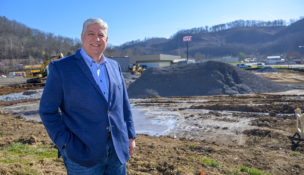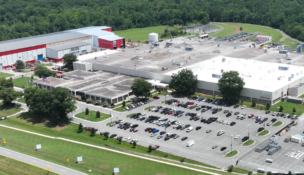Pulaski company aims for pollution revolution
Kate Andrews //June 30, 2020//
Pulaski-based MOVA Technologies is poised to go commercial with a system that removes coal ash and other chemical pollutants from the air — extracting chemicals that can be recycled and sold for industrial use.
Named Project Revolution, the panel-bed filtration system absorbs fly ash particles, nitrogen oxide, sulfur oxide and carbon dioxide from coal-fired chimney stacks at plants. Captured chemicals could then be sold to manufacturers to be used to produce paper, dyes, cement and fertilizers.
“It’s literally going to revolutionize pollution control,” says owner Steve Critchfield, a prominent property investor in Pulaski. The new system is expected to cost about 25% less than existing pollution-removal systems, which typically run like catalytic converters, reducing toxic emissions from power plants but not absorbing chemicals, he says.
MOVA has worked closely with Virginia Tech’s College of Agriculture, chemistry department and mechanical engineering department, where Joseph Meadows was principal investigator on a proof of concept report, which was released June 29. According to the report, “the Virginia Tech team believes that a successful POC was achieved,” meaning that the system captures gaseous pollutants.
Meadows and his colleague, Virginia Tech chemical engineering professor Steve Martin, found that the system’s absorption of nitrogen oxide and sulfur oxide “were very promising,” Meadows says.
During the past year, Critchfield and his colleagues at MOVA have “kept [their] cards close” to their vests about the project, filing patents and raising nearly a million in investment dollars mostly from Virginia-based backers, as well as receiving a grant from Herndon’s nonprofit Center for Innovative Technology.
MOVA’s next move is to apply for commercial permits. The company has already started seeking land in Southwest Virginia to build a $2 million to $3 million manufacturing facility that Critchfield expects to open in about two years, producing hundreds of fabrication jobs paying $30 to $40 an hour. MOVA’s corporate headquarters will remain in Pulaski.
Critchfield says the system’s customers could include companies with clean energy objectives, such as Dominion Energy Inc. and Smithfield Foods Inc. Other uses could include capturing ammonia, methane and hydrogen from poultry processing plants, removing the pollutants to be recycled into natural fertilizer.
“Imagine the power of catching all that,” he says.
Subscribe to Virginia Business.
l



















